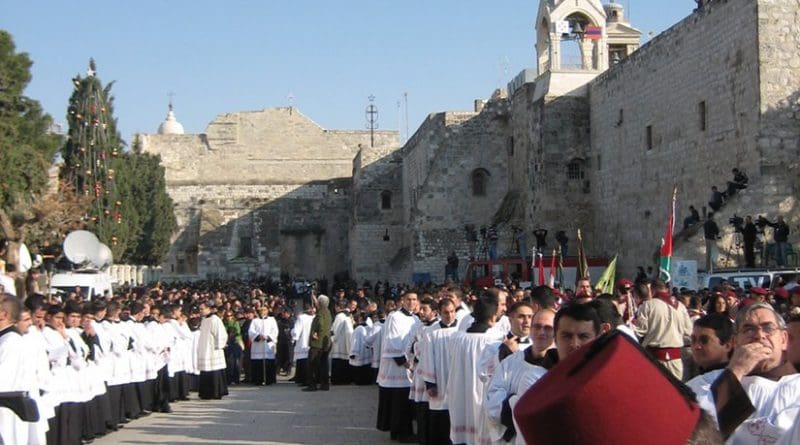Dimming Bethlehem’s Christmas Celebrations – OpEd
By Jessica Purkiss*
Normally around this time in Bethlehem, the birthplace of Jesus Christ, Christmas festivities are in full swing. This year, however, the municipalities decided to tone down their public Christmas celebrations amid escalating violence in the Holy Land. In Bethlehem, while the famous tree lighting ceremony went ahead, albeit with messages highlighting Palestine’s plight during the countdown, the usual fireworks afterwards did not, as in other governorates, and church bells rang out instead. In Ramallah, the usual tree lighting was cancelled.
Ziad Bandak, adviser to the head of Christian National and International Relations, said that the decision was made out of respect for those who have died. Since September, the situation in the Occupied Palestinian Territories has deteriorated, with over 120 Palestinians having been killed in the violence. In Bethlehem, home to a number of refugee camps, things have been incredibly tense with streets full of tear gas and protests too frequently met with live fire. The recent events have been described as a third intifada.
In a meeting with Al-Monitor, Bandak explained that the decision had been based on objective reasoning. “Religious holidays, whether Christian or Muslim, cannot be cancelled, but we, as church representatives and municipalities in Palestine, are trying, under the current conditions in our country, to balance between [harsh] conditions and holiday celebrations,” he said. “In light of the situation on the ground, we decided to limit holiday festivities, but not cancel them all. We will celebrate Christmas by sending a message of life, peace and love from the birthplace of Jesus Christ to make the voice of our people, facing daily actions by Israel, heard.”
Father Jamal Khader, Rector of the Latin Patriarchate Seminary, noted that all religious ceremonies, such as the procession and midnight mass, will continue as normal. He said that the other festivities are being toned down because “in these circumstances we cannot carry on as if everything is fine”.
“It’s a message to show there is something wrong and we cannot tolerate this injustice. This is a message for ourselves and for the world – we are still suffering.”
But some believe that the current situation gives the festivities extra importance. As life becomes more fragmented in the Holy Land, as a result of Israeli policies such as settlement building and land confiscation, the Palestinian people must remain united. Reverend Ashraf Tannous, Lutheran Pastor of Beit Sahour, a town on the outskirts of Bethlehem, stressed: “Not only is it [Christmas] a Christian celebration, it is a national celebration. This celebration is celebrated by everyone regardless of religion. We are all celebrating this season.”
He noted: “The agenda of the occupation is to stop us celebrating, to stop us lighting the tree, or singing carols…but in-spite of the desperate situation in the Holy Land we still celebrate.” Tannous added: “These celebrations give hope to people who are suffering.”
Gazan born activist Bessiso, a Muslim who now lives in the West Bank, visits the tree lighting ceremony in Bethlehem every year. She calls for preserving all manifestations of Christmas joy and celebration because, she says, it gives Christians a sense of belonging to this land, which would not be complete without them. The OPT has been facing a mass exodus of Christians – for example, in 1947, Christians made up 80 per cent of the population of Bethlehem. Today, Christians make up only around 20 per cent of the city’s population, with the past decade alone seeing over ten per cent of Christians leaving for pastures new overseas.
Mayor of Bethlehem Vera Baboun noted how all Bethlehem’s population, regardless of religion, is struggling under occupation. “We are talking about settlements, we are talking about land confiscation, we are talking about the wall. Can you imagine, on 82 per cent of the land we can do nothing without an Israeli permit?” She highlighted the recent decision to confiscate 25 acres of land from the northern border of the governorate, adding: “This is the suffocation of Bethlehem”. As a result of the current situation, local businesses are feeling the pinch this Christmas – hotels have experienced 11.1 per cent decrease in occupancy. “Even Christmas, the season we wait for, is affected,” said Baboun. “It is not just the hotels affected, but also the restaurants, the souvenir shops.”
The decision to tone down the festivities has been met with criticism from some who see celebrating as a form of non-violent resistance, and welcomed by others who see the lack of it a message to the world that Palestine is struggling. But one thing is painfully clear: Palestine is suffering.
(This article was first published in Middle East Monitor)

